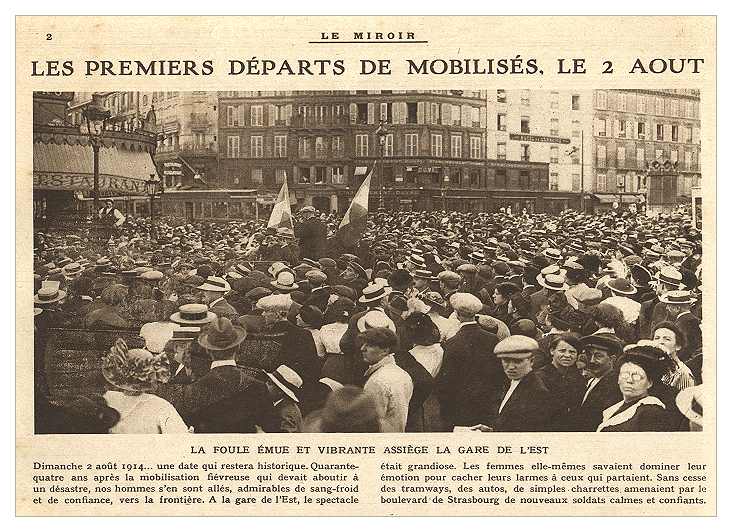Paris Mobilizes
from a French newsmagazine, 'Le Miroir' issue
37, August 9th 1914


- top : ethnic Czechs in Paris proclaim admiration of
France
- under : requisitioning horses and vehicles


- top and under : the first levy of mobilised recruits at
the Gare de l'Est in Paris
-
- 'As our train passed
through France on its way to Nancy, we
heard and saw the tumult of a nation
arming itself for war and pouring down to
its frontiers to meet the enemy. All
through the night, as we passed through
towns and villages and under railway
bridges, the song of the Marseillaise
rose up to the carriage windows and then
wailed away like a sad plaint as our
engine shrieked and raced on. At the
sound of the national hymn one of the
officers in my carriage always opened his
eyes and lifted his head, which had been
drooping forward on his chest, and
listened with a look of puzzled surprise,
as though be could not realize even yet
that France was at war and that he was on
his way to the front. But the other
officers slept; and the silent man, whose
quiet dignity and sadness had impressed
me, smiled a little in his sleep now and
then and murmured a word or two, among
which I seemed to hear a woman's name.
-
- In the dawn and
pallid sunlight of the morning I
saw the soldiers of France
assembling. They came across the
bridges with glinting rifles, and
the blue coats and red trousers
of the infantry made them look in
the distance like tin soldiers
from a children's playbox. But
there were battalions of them
close to the railway lines,
waiting at level crossings, and
with stacked arms on the
platforms, so that I could look
into their eyes and watch their
faces. They were fine young men,
with a certain hardness and
keenness of profile which
promised well for France. There
was no shouting among them, no
patriotic demonstrations, no
excitability. They stood waiting
for their trains in a quiet,
patient way, chatting among
themselves, smiling, smoking
cigarettes, like soldiers on
their way to sham fights in the
ordinary summer manoeuvres. The
town and village folk, who
crowded about them and leaned
over the gates at the level
crossings to watch our train,
were more demonstrative. They
waved hands to us and cried out
" Bonne chance !" and
the boys and girls chanted the
Marseillaise again in shrill
voices. At every station where we
halted, and we never let one of
them go by without a stop, some
of the girls came along the
platform with baskets of fruit,
of which they made free gifts to
our trainload of men. Sometimes
they took payment in kisses,
quite simply and without any
bashfulness, lifting their faces
to the lips of bronzed young men
who thrust their képis back and
leaned out of the carriage
windows.
-
- The fields were
swept with the golden light of
the sun, and the heavy foliage of
the trees sang through every note
of green. The white roads of
France stretched away straight
between the fields and the hills,
with endless lines of poplars as
their sentinels, and in clouds of
grayish dust rising like smoke
the regiments marched with a
steady tramp. Gun carriages moved
slowly down the roads in a glare
of sun which sparkled upon the
steel tubes of the field
artillery and made a silver bar
of every wheel-spoke. I heard the
creak of the wheels and the
rattle of the limber and the
shouts of the drivers to their
teams ; and I thrilled a little
every time we passed one of these
batteries because I knew that in
a day or two these machines,
which were being carried along
the highways of France, would be
wreathed with smoke denser than
the dust about them now, while
they vomited forth shells at the
unseen enemy whose guns would
answer with the roar of death.
-
- Guns and men,
horses and wagons, interminable
convoys of munitions, great
armies on the march, trainloads
of soldiers on all the branch
lines, soldiers bivouacked in the
roadways and in market places,
long processions of young
civilians carrying bundles to
military depots where they would
change their clothes and all
their way of life - these
pictures of preparation for war
flashed through the carriage
windows into my brain, mile after
mile, through the country of
France, until sometimes I closed
my eyes to shut out the glare and
glitter of this kaleidoscope, the
blood-red colour of all those
French trousers tramping through
the dust, the lurid blue of all
those soldiers' overcoats, the
sparkle of all those gun- wheels.
What does it all mean, this
surging tide of armed men ? What
would it mean in a day or two,
when another tide of men had
swept up against it, with a roar
of conflict, striving to
overwhelm this France and to
swamp over its barriers in waves
of blood ? How senseless it
seemed that those mild-eyed
fellows outside my carriage
windows, chatting with the girls
while we waited for the signals
to fall, should be on their way
to kill other mild-eyed men, who
perhaps away in Germany were
kissing other girls, for gifts of
fruit and flowers. '
-
-
- from : Philip
Gibbs ‘The Soul of the
War’ 1915
Back
Introduction




